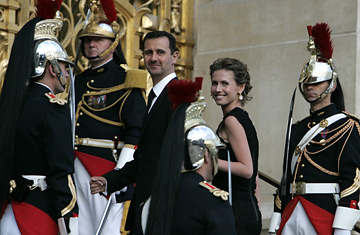
Syrian President Bashar al-Assad and his wife Asma arrive for a formal dinner after a Mediterranean Summit meeting at the Petit Palais in Paris
For the head of state of a former French colony, an official visit to Paris is always a good chance do a little shopping, take in some culture, and impress the folks back home. So it was for Bashar al-Assad, the President of Syria (which was once ruled by France under a League of Nations Mandate). Over the past weekend, Syrian state television has been beaming round-the-clock images of the Syrian President and his tres chic First Lady making the scene in the City of Light: Bashar at a summit for Mediterranean leaders, Asma at the Louvre and Centre Pompidou, and both of them as official guests of French President Nicholas Sarkozy at Bastille Day celebrations on Monday. From all the high-wattage smiles, it's clear they're having a blast.
And well they should. Not so long ago the Syrian first couple were personae non grata in Western capitals. The U.S., which accuses Syria of sponsoring terrorism, led an effort to isolate the country diplomatically and economically. And in a rare instance of Franco-American harmony, France had its own grudge against Syria: the 2005 assassination of Rafik Hariri, the former Lebanese Prime Minister and close friend of former French President Jacques Chirac, an act for which many in the West blamed Syria.
But now Syria is back in style. The invitation to Paris is ostensibly a reward for the the start of indirect peace talks between Syria and Israel (through Turkish mediation.) But it's also recognition that attempts to isolate Syria have failed, and that the West needs Syrian help for resolving some of the biggest problems in the Middle East. For its part, Syria wants to come even further out of the cold. While in Paris, President Assad told French television that in the event of direct talks under American sponsorship, there could be peace between Syria and Israel within two years. So on the Fourth of July 2010, will Bashar be celebrating Independence Day in Washington?
Maybe, but maybe not. Of all the Middle Eastern conflicts, the rift between Israel and Syria would appear to be the easiest to mend. Israel would just have to return the Golan Heights, a rocky Syrian plateau that Israel captured in 1967. If Israel had a strong leader with a popular mandate (admittedly a big if) this wouldn't be impossible given that Israeli settlement in the Golan is relatively sparse and the Heights are no longer so strategically important thanks to advances in Israeli defense technology. But the tougher question is what Israel should get in return for the Golan.
Israel and the U.S. want more than just an end to a state of war between Syria and Israel. They also wants Syria to stop supporting anti-Israeli militant groups in Palestine and Lebanon (Hamas and Hizballah, respectively.) In other words, they want Syria to break away from its strategic partnership with Iran, the senior member of what's sometimes referred to as the Rejectionist Crescent, the arc of governments and militias stretching from Tehran to Gaza that oppose American and Israeli dominance in the Middle East.
But Syria isn't going to abandon Iran, according to figures close to the Assad regime here in Damascus. It's not just that the elite of Iran and Syria have a long history of cooperation going back to 1979, when Syria was the first country to recognize the newly established Islamic Republic of Iran. It's also because Syria has no reason to switch sides just when its team is winning. From the fiasco of America's invasion of Iraq, to Hamas's victory in Gaza and Hizballah's victory in Lebanon, Iranian and Syrian power is on the rise in the Middle East. Defying America and Israel is the most popular position in most of the Arab world, and has helped keep the Assad regime in power all these years. Why change now?
Assad only wants a package deal, a grand bargain between Syria and Iran on the one hand, and American and Israel on the other, that would settle the cold war for the Middle East. This means that the United States would have to give up once and for all its project for a "new" Middle East, and its penchant for regime change. That might happen on its own in November if Barack Obama becomes President. But a package deal would also have to solve the Iranian nuclear issue, map out the future of post-American Iraq, solve the Syrian-Israeli conflict, the Lebanese-Israeli conflict and the Palestinian-Israeli conflict all in one go. Would any American President, or any world leader, be able to pull that off in two years? Despite President Assad's rosy prediction, it's hard to imagine him shaking hands in the Rose Garden anytime soon. But at least he'll always have Paris.
